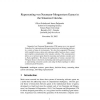Free Online Productivity Tools
i2Speak
i2Symbol
i2OCR
iTex2Img
iWeb2Print
iWeb2Shot
i2Type
iPdf2Split
iPdf2Merge
i2Bopomofo
i2Arabic
i2Style
i2Image
i2PDF
iLatex2Rtf
Sci2ools
124
click to vote
AMAI
2004
Springer
2004
Springer
Representing von Neumann-Morgenstern Games in the Situation Calculus
Sequential von Neumann-Morgernstern (VM) games are a very general formalism for representing multi-agent interactions and planning problems in a variety of types of environments. We show that sequential VM games with countably many actions and continuous utility functions have a sound and complete axiomatization in the situation calculus. This axiomatization allows us to represent game-theoretic reasoning and solution concepts such as Nash equilibrium. We discuss the application of various concepts from VM game theory to the theory of planning and multi-agent interactions, such as representing concurrent actions and using the Baire topology to define continuous payoff functions.
| Added | 16 Dec 2010 |
| Updated | 16 Dec 2010 |
| Type | Journal |
| Year | 2004 |
| Where | AMAI |
| Authors | Oliver Schulte, James P. Delgrande |
Comments (0)

